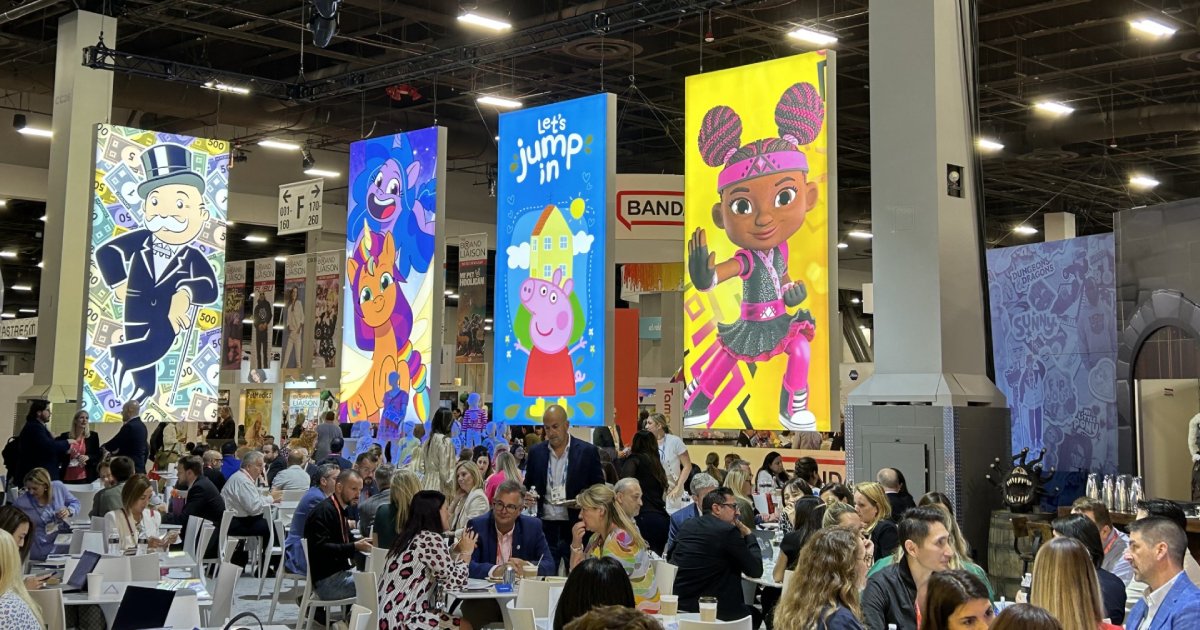
Diversification on Display at Licensing Expo
By Mark Seavy
Gone are the days when licensors and licensees could focus on a narrow scope of products and categories. As a result, attendees at this year’s Licensing Expo in Las Vegas can expect to see a diverse range of IPs.
This diversification is being driven by a number of things, including the fact that more properties from streaming services, social media platforms, and YouTube are serving as the source of successful licensing programs; there is an increasing appetite for food and beverage licensing; there is a wider array of location-based entertainment offerings; and the growing popularity of sports brands (with a specific focus on women’s sports).
“There has never been a time in entertainment where content is available via as many platforms,” said Russell Binder at Striker Entertainment. “Having a successful IP in one vertical has value, but having that IP introduced to audiences across multiple platforms is the clear advantage in the highly fractured way youth, young men and women are consuming content. Transmedia has never been as critical as it is now to meet audiences where they are, and serve up content based on an IP tailored made to the platform its being experienced on is one of the most potent strategies for rightsholders who want to have the broad engagement and market share vs. limited niche appeal.”
This broader approach to licensing will be seen on the Expo show floor. Sega America will be emphasizing Sonic the Hedgehog not only with a new film that is due in December, but also a Knuckles television series on Paramount+, comic books with IDW, and the new videogame Sonic X Shadow Generations, which will be released across gaming platforms this fall.
And while it won’t be on the show floor, children’s book author Mo Willems’ Hidden Pigeon Co., fresh from a private equity investment last year, will be at the tradeshow seeking licensing deals for the first time across toys, apparel, home goods, and other products. Willems’ books, including the Pigeon and Elephant and Piggies series, are also set to release content across a range of platforms. Additionally, a new book in the Pigeon series will launch on June 4th under the Union Square & Co. imprint, which replaced Disney’s Hyperion as publisher.
“The whole landscape is changing, and you look at some of the top evergreen properties out there and there has been some slippage,” said Tori Cook, SVP Franchise Management at Hidden Pigeon Co. “There has been a content gap caused by the writers’ strike and publishing is a form of content with a fanbase and awareness around it. Retailers are looking for something that does have awareness, is a fit for many different consumer needs, and is right for parents and their children today.”
In an effort to capitalize on awareness, a number of social media and YouTube content creators are expanding beyond the platforms where they got their start to partner with streaming services and launch licensing programs.
Vivienne Medrano launched Hazbin Hotel on YouTube in 2019 but moved to Amazon Prime earlier this year with an eight-episode animated series, the pilot of which had gained 100 million views on YouTube by February.
“Superheroes are status quo, but brands that have been around a long time that haven’t had a significant movie or series [recently], the only thing that is going to get them to move is newness,” Trevco CEO Trevor George said. “And that’s because the consumer already has the merchandise, they bought it three to five years ago, and they now need something brand new.”
Outside of content, mall operator Brookfield Properties will be another exhibitor at this year’s event seeking to diversify. The company is focused on attracting LBE to its properties and Esther Sarpong, Director of Experiential Retail at Brookfield, is giving the presentation Beyond Shopping: Immersive Entertainment Concepts Choosing Retail Spaces.
“The traditional licensing is still there, but deal terms aren’t nearly as lucrative for licensors except for some of major studios,” said Jed Ferdinand, a partner at Meister, Seelig & Fein. “Otherwise, royalties have come down, minimum guarantees are harder to get, and fewer licensees are willing to risk and sign up for a new license without rock solid distribution already in place, meaning they have identified a retailer and there is a direct-to-consumer portal that is available.”

















